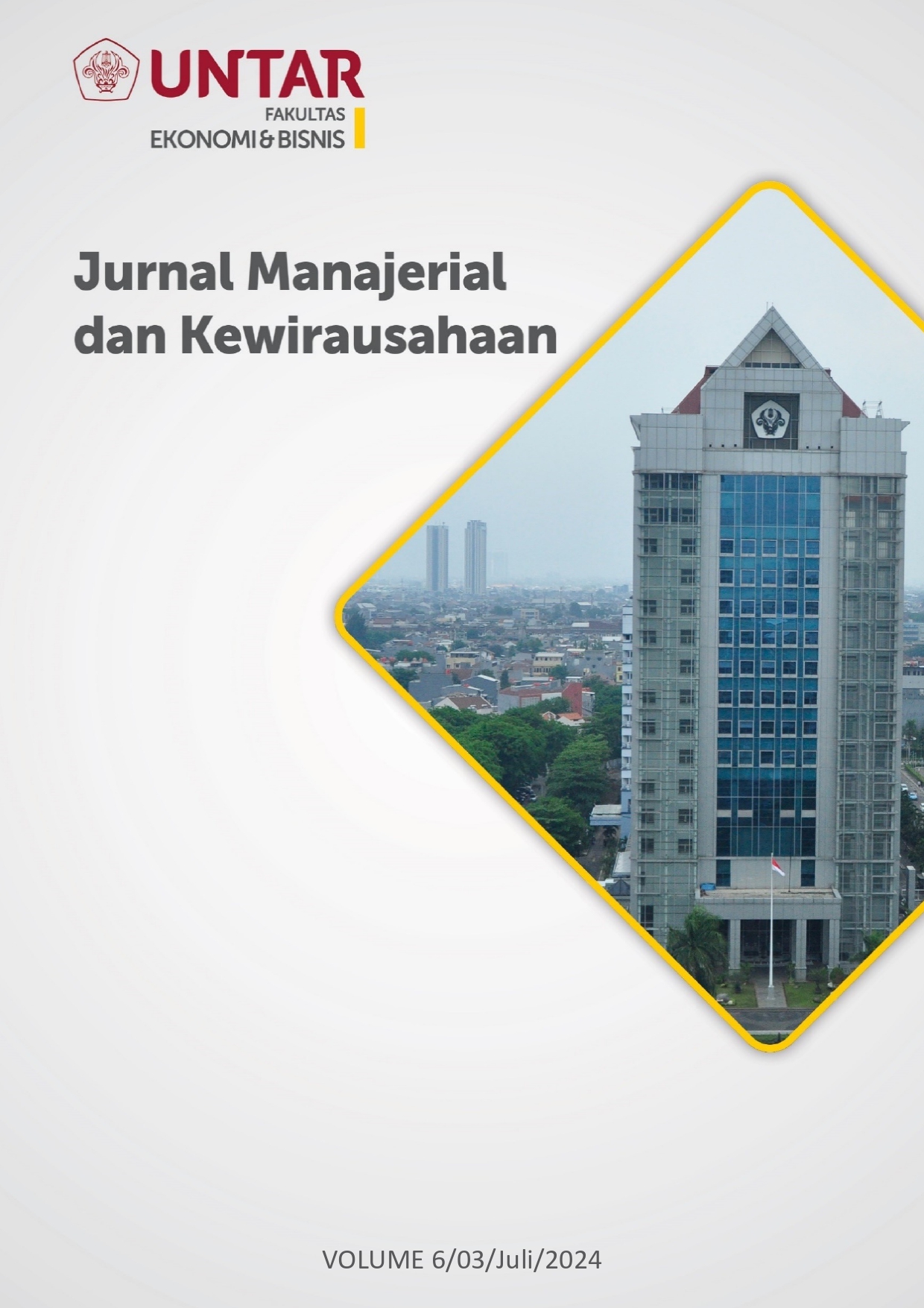Pengaruh Pendidikan Kewirausahaan, Dukungan Sosial dan Locus of Control terhadap Intensi Berwirausaha
Main Article Content
Abstract
This study aims to analyse and determine the effect of entrepreneurship education, social support and locus of control on entrepreneurial intention. The sample selection technique in this study used non probability sampling technique with convenience sampling method. The sample in this study were active students and studying in Jambi City with a total sample of 139 respondents. The data were analysed using the SEM method with the SmartPLS 4.1 application. The results of this study indicate that there is a positive and significant influence between entrepreneurship education, social support and locus of control on entrepreneurial intentions.
Article Details

This work is licensed under a Creative Commons Attribution-NonCommercial-ShareAlike 4.0 International License.
This work is licensed under a Jurnal Muara Ilmu Ekonomi dan Bisnis Creative Commons Attribution-ShareAlike 4.0 International License.,/p>
References
Arkorful, H. & Hilton, S. K. (2022). Locus of Control and Entrepreneurial Intention: A Study in A Developing Economy. Journal of Economic and Administrative Sciences, 38(2), 333-344. https://doi.org/10.1108/JEAS-04-2020-0051
Asmuruf, T. A. & Soelaiman, L. (2022). Entrepreneurship Intentions among Vocational School Students in Sorong Regency - West Papua. Dalam International Conference on the Applications of Social Sciences and Humanities 2021, 1301-1306. https://dx.doi.org/10.2991/assehr.k.220404.208
Aurellia, K. & Puspitowati, I. (2023). Pengaruh Pendidikan Kewirausahaan, Kreativitas, dan Efikasi Diri Kewirausahaan terhadap Intensi Berwirausaha. Jurnal Manajerial dan Kewirausahaan, 5(3), 677-686. https://doi.org/10.24912/jmk.v5i3.25407
Blegur, A. & Handoyo, S. E. (2020). Pengaruh Pendidikan Kewirausahaan, Efikasi Diri dan Locus of Control terhadap Intensi Berwirausaha. Jurnal Manajerial dan Kewirausahaan, 2(1), 51-61. https://doi.org/10.24912/jmk.v2i1.7424
Chang, J., & Rieple, A. (2013). Assessing students' entrepreneurial skills development in live projects. Journal of Small Business and Enterprise Development, 20(1), 225-241.
Costa, N., Neto, J. S., Oliveira, C., & Martins, E. (2020). Student´ s Entrepreneurial Intention in Higher Education at ISLA–Instituto Politécnico de Gestão e Tecnologia. Procedia Computer Science, 204, 825-835.
Fachruddin, Imam. (2009). Desain Penelitian. Malang: Universitas Islam Negeri.
Gelaidan, H. M., & Abdullateef, A. O. (2017). Entrepreneurial intentions of business students in Malaysia: The role of self-confidence, educational and relation support. Journal of small business and Enterprise Development, 24(1), 54-67.
Ghufron, M. N., & Suminta, R. R. (2010). Teori-teori psikologi.
Hair, J. F., Tomas, G. M. H., Ringle C. M., & Sarstedt, M. (2015). A primer on partial least squares structural equation modeling PLS SEM. International Journal of Research Method in Education Volume 38, 220 – 221.
Hassan, A., Anwar, I., Saleem, A., Alalyani, W. R., & Saleem, I. (2022). exus between entrepreneurship education, motivations, and intention among Indian university students: the role of psychological and contextual factors. Industry and Higher Education, 36(5), 539-555.
Ivan, J. (2020). Pengaruh internal locus of control, sosial support, efektifitas pendidikan kewirausahaan terhadap minat berwirausaha mahasiswa universitas ciputra. Performa: Jurnal Manajemen dan Start-Up Bisnis Volume 4 No.6, 841-851.
Kadiyono, A. L. (2017). Pengaruh Emotional Capital Terhadap Intensi Berwirausaha Pada Siswa Setara SMA di Jatinangor. Sosiohumaniora, 19(2), 167-176.
Kreitner, R. & Kinicki, A. 2013. Organizational Behaviour. (10th Ed.). New York: McGraw-Hill Higher Education
Marco, B. C. & Selamat, F. (2022). Pengaruh Efikasi Diri Kewirausahaan, Dukungan Sosial, dan Dukungan Edukasi terhadap Intensi Kewirausahaan Sosial pada Mahasiswa Perguruan Tinggi di Jakarta. Jurnal Manajerial dan Kewirausahaan, 4(2), 289-300. https://doi.org/10.24912/jmk.v4i2.18221
Primandaru, N. (2017). Analisis faktor-faktor yang berpengaruh pada minat berwirausaha mahasiswa. Yogyakarta State University.
Rotter, J. B. (1954). Social learning and clinical psychology.
Santos, S., & Liguori, E. W. (2019). How and when is self-efficacy related to entrepreneurial intentions: Exploring the role of entrepreneurial outcome expectations and subjective norms. Revista de Estudios Empresariales. Segunda Época, (1).
Sanusi, Anwar. 2011. Metodologi Penelitian Bisnis. Penerbit Salemba Empat. Jakarta.
Sarafino, E. P., & Smith, T. W. (2014). Health psychology: Biopsychosocial interactions. John Wiley & Sons.
Septiawati, S. (2017). Pengaruh dukungan sosial dan kepribadian ekstraversi terhadap minat berwirausaha pada mahasiswa, 4(2), 77-84.
Sugiyono. (2014). Metode Penelitian Kuantitatif Kualitatif dan R&D. Bandung: Alfabeta.
Sugiyono. (2016). Metode penelitian kuantitatif, kualitatif dan R&D. Bandung: Alfabeta.
Sugiyono. (2018). Metode Penelitian Kuantitatif. Bandung: Alfabeta.
Wijaya, W. & Handoyo, S. E. (2022). Pengaruh Pendidikan Kewirausahaan, Empati dan Dukungan Sosial terhadap Intensi Berwirausaha Sosial Mahasiswa. Jurnal Manajerial dan Kewirausahaan, 4(2), 546-555. https://doi.org/10.24912/jmk.v4i2.18263



